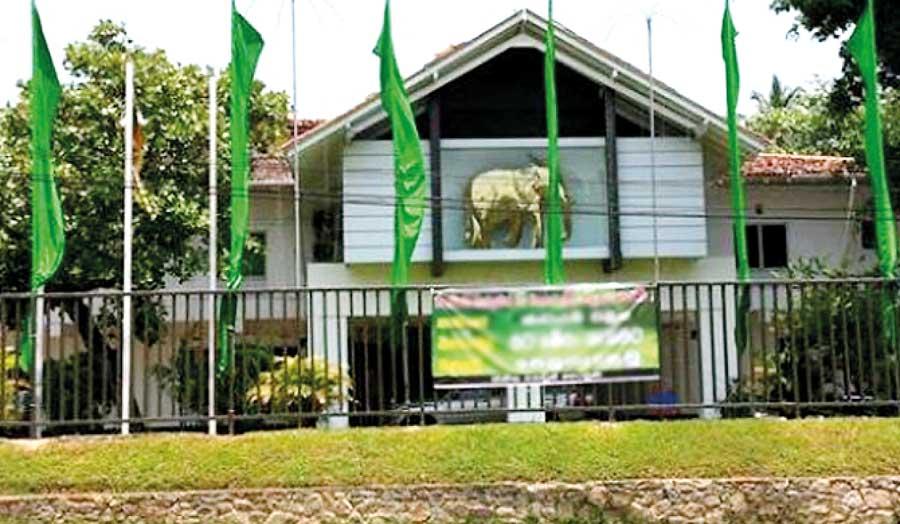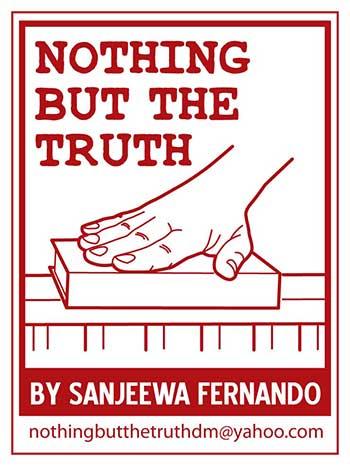Reply To:
Name - Reply Comment

“Free election of masters does not abolish the masters or the slaves.”
― Herbert Marcuse
The unforeseeable has happened. For the first time in the history of our Parliament, at least after the UNP was  founded in the year 1944, the UNP will not have a single member present in the legislature when the Ninth Parliament convenes tomorrow, the 20th of August. As the Grand Old Party suffered its most humiliating and abysmal election setback when it failed to win a single electoral seat in the recently held General Election and the National list seat it secured has not been finalised as yet, there will be no UNP Member of Parliament, sitting tomorrow for the inaugural session at Diyawanna.
founded in the year 1944, the UNP will not have a single member present in the legislature when the Ninth Parliament convenes tomorrow, the 20th of August. As the Grand Old Party suffered its most humiliating and abysmal election setback when it failed to win a single electoral seat in the recently held General Election and the National list seat it secured has not been finalised as yet, there will be no UNP Member of Parliament, sitting tomorrow for the inaugural session at Diyawanna.
The one time vote magnet
It is not a simply a matter of one particular political party being uprooted from the national political landscape in terms of the voter base it has enjoyed since its inception. The same concern that democracy loving citizens ought to have had when the SLFP was made a laughing stock and ultimately an appendage of the SLPP, is felt, when the one time biggest party with its most recognised elephant symbol, a vote magnet during elections during J.R. Jayewardene and R. Premadasa times, fails to win a single seat under that iconic symbol and the green flag; It is in fact, a setback for parliamentary democracy, representative governance and a bipolar party oriented electoral system in one of the oldest democracies, not only in Asia, but the entire civilized world. With the fall of the SLFP earlier and now the routing of the UNP, the entire electoral matrix has been turned on its head. The only question is, whether it is for the good or the worse.
Ever since independence, Sri Lankan politics have been party based. Whether we like it or not there remained this strong sentiment of party allegiance among the citizens, translating into very dogged and sometimes blind following of party lines. Sometimes violence erupts in towns and villages, even spouses are embittered over their party loyalties leading up to and during election times. On a more serious note, party politics had become a cause of disruption of civil society affairs, favouritism, political and moral degradation to the extent that the very principles of representative democracy that political parties are supposed to represent, uphold and protect have been subverted. Nevertheless, and despite all that, the two grand old parties, the UNP and the SLFP, have been the mainstay of Sri Lankan politics for the last three-quarters of a century.
Do they deserve it?
Many are of the view that the UNP and the SLFP are responsible for the maladies that ail our body politic as the two parties who have ruled us since independence, at least till now, when not only the legislature and the executive both, are not manned from members of the two parties but even the main opposition is from outside their ambit. While many blame S.W.R.D. Bandaranaike and the SLFP led government for igniting racial disharmony with the Sinhala Only Act in 1956 and ushering in Sinhala Buddhist chauvinistic elements as veritable tools of gaining political power, on the other hand, the UNP is blamed for many of the evils that have arisen from the economic model introduced after 1977 as well as the violent and brutal suppression of dissent and rebellion in the South. On that account, one may say they deserve what they are getting now. But on the other hand, now that the UNP is obliterated and the SLFP without a say in power wielding, how will governance be carried out by the Parties that have emerged, namely the SLPP, which is firmly in control of the ruling apparatus and the SJB which, in a matter of months has eclipsed or shall we say, attracted the voter base of the UNP and with a good chance of vying for power in future elections?
Personality cult
We all know that the SLPP was the expression of a desire to have a Rajapaksa dynasty and it to be perpetuated. The remaining parties who tail them are pure cannon fodder for the now almost invincible aspiration of long term entrenchment in power by the Rajapaksa family. It is very difficult to see a non-Rajapaksa personality being given the reigns of that party specially in a context that it is the most dominating political party at this point, and is tipped to be so in the years to come. The internal mechanism of that party will be dictated by Mahinda Rajapaksa and his siblings while other prominent leaders such as Vasudeva, Dinesh, Weerawansa are relegated to the role of cohorts.
"With the fall of the SLFP earlier and now the routing of the UNP, the entire electoral matrix has been turned on its head"
On the other side of the spectrum, the SJB, a breakaway faction from the UNP, as a result of refusal by Ranil Wickremesinghe the party leader for over two decades and under whose leadership the Grand Old party had suffered more than thirty elections, to step down, is a political arrangement that is based and focused on the advent of Sajith Premadasa, the most popular UNP leader before the split. Within the SJB also, there is little likelihood of anyone else becoming the leader in decades to come. While the brand of politics that Sajith represents might be somewhat distinct from the policies followed by UNP under Ranil, he is a populist in the mould of his father, the late President Ranasinghe Premadasa, and in that context more akin to Mahinda Rajapaksa than any other politician alive today. He too, like Mahinda, relies heavily on the personality cult, rather than party policies.
A new political landscape
When the new SLPP government came to power, it had the overwhelming mandate of the people who wanted a strong government. It was something the UNP-SLFP alliance under the banner of good governance, failed to deliver. With their failure, not only have those two parties lost the commanding positions they enjoyed in the Sri Lankan national political landscape, but they have allowed the fate of our representative democracy to be left, at the mercy of two political conglomerations that give little regard to norms of either liberal democracy or alternatively social democracy, as the two traditional main parties were wont to do.
As the Ninth Parliament convenes at Diyawanna tomorrow without a single UNP member, and the SLFP reduced to a pitiable appendage of the Rajapaksa dynasty, a legislature dominated by a virtual, if not official 2/3 majority at the disposal of the Rajapaksas and the role of the main opposition played by the SJB with Sajith Premadasa at the helm with his populist and personality oriented politics in the mould of his late father, Sri Lankan representative democracy will enter a new chapter.
Authoritarianism and populism entrenched in the seats of the legislature with democracy, in both of its more normative forms of liberal and social, reduced to mere onlookers, is the new order.